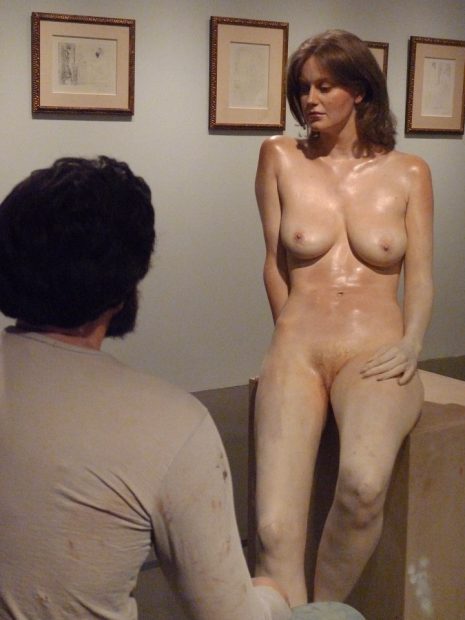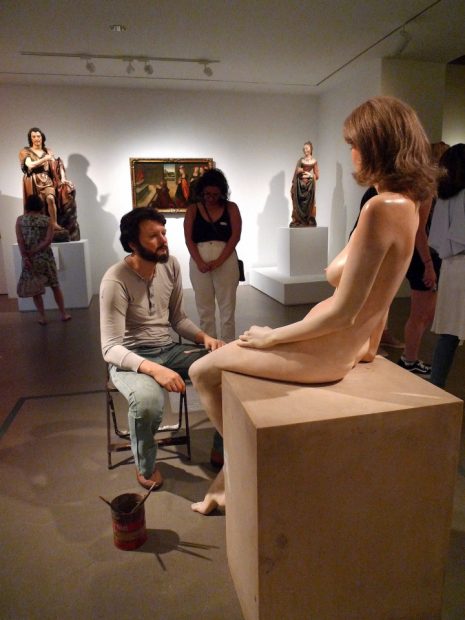This November, San Antonio art historian Ruben Cordova was censored by Facebook. For the past nine years, Dr. Cordova had been using the platform as a way to archive his research, thoughts and records — an idea that was good in theory for a few reasons: Due to the website’s sizable user base, its teams of engineers, and its popularity, it is unlikely that Facebook would crash and lose his data.
What Dr. Cordova didn’t predict was that an image he posted would get him kicked off of Facebook entirely, causing him to lose all access to his work. The reason was a set of photographs of artist John De Andrea’s 1980 artwork Self-Portrait with Sculpture, which Dr. Cordova saw in the exhibition Like Life: Sculpture, Color, and the Body (1300–Now) at the Met Breuer in New York. It seems like the sculpture has lived up to the title of this show, and ultimately tricked the social media giant’s algorithm and moderators into flagging and permanently blocking Dr. Cordova’s account.
De Andrea’s sculpture isn’t the first artwork to be caught in the crosshairs of Facebook’s nudity policy: a blurry nude painting by Gerhard Richter, multiple sexually expressive artworks posted by Jerry Saltz, and a photograph of a butt by Kate Durbin are just a small sampling of pieces censored by Facebook.
In recent years, Facebook has beefed up its moderation team, due to growing issues of content on the site. The company says that it plans to bring on 20,000 people to deal with day-to-day moderation on the site by the end of 2018. And in a recent Motherboard article, writers Jason Koebler and Joseph Cox reported that Facebook claims its AI moderation tools — which are trained by human moderators — work in most cases:
“By Facebook’s metrics, for every instance of the company mistakenly deleting (or leaving up) something it shouldn’t, there are more than a hundred damaging posts that were properly moderated that are invisible to the user.”
Still, cases like Dr. Cordova’s are more complex: though his account was ultimately banned on November 16, 2018, a Facebook human moderator contacted him three days prior about the photos, but reinstated his account after recognizing that the images in question were of a sculpture. This means that it’s likely that Dr. Cordova was either then the victim of an AI moderation tool that recognized the lifelikeness of the sculpture and concluded that it was a photo of a real nude woman, or that a human moderator made the same mistake. Either way, once Dr. Cordova attempted to contact the company about his ban, he found them unresponsive. As of December 11, Dr. Cordova told Glasstire that his account is still banned, and that neither he, nor anyone he has talked to, knows how to get in touch with anyone at Facebook who can or will address the issue.
Another nuance in Dr. Cordova’s case is that he was compiling his Facebook database for academic and educational purposes — he teaches, and regularly lectures on art and artists in San Antonio and abroad. The company’s community standards claim that Facebook restricts images of nudity, sexual activity, and digital content that shows sexual activity “unless it is posted for educational, humorous, or satirical purposes.” The policy goes on:
“Our nudity policies have become more nuanced over time. We understand that nudity can be shared for a variety of reasons, including as a form of protest, to raise awareness about a cause, or for educational or medical reasons. Where such intent is clear, we make allowances for the content. For example, while we restrict some images of female breasts that include the nipple, we allow other images, including those depicting acts of protest, women actively engaged in breast-feeding, and photos of post-mastectomy scarring. We also allow photographs of paintings, sculptures, and other art that depicts nude figures.”
For now, Dr. Cordova is still hoping to get his account back. And he told Hyperallergic that if he were allowed back on the platform, he’d go willingly:
“I want my account back, and I want to continue posting. I have made numerous excellent contacts through Facebook. Many people respond to Facebook messages, but not to emails! Right now, I am unable to contact most of the people I know personally because their phones or email addresses have changed.”
Look for a forthcoming article on Glasstire in which Dr. Cordova writes about his and others’ experiences of being censored by Facebook.





5 comments
In September, my account was disabled by FB also. The reason was because someone (most likely a stranger) reported me for using my nickname instead of my birth name. My reason is because I have been stalked/harassed in the past and using a nickname is a matter of personal security. FB LET ME change my birth name 2 yrs ago to the nickname I was using. I think it’s time for us to have a serious conversation about just how much FB has control over our professional lives. I can say that w/out it, I waste so much less time. However, having organically made hundreds of professional contacts on FB over the last 10 yrs, this is a major setback for me. I have a gallery page (Three Walls Gallery) that I cannot access. This is not to be taken lightly. This conglomerate, who has billions of users, is not available for tech support. No email addys, no phone numbers, you are SOL if they decide to disable you. It could happen to you. Personally, I have jumped through all the hoops they have for getting your account back online (file reports in triplicate!) and nothing has been done. If anyone has info on a contact there, I’m sure people like Dr. Cordova and myself would greatly appreciate it. They are f’ing with our lives. What are we going to do about a corporation that has this much control over us? If you are concerned about your privacy and controlling your personal information, which is now being weaponized, write to your reps and senators and tell them to start talking about regulating these giant tech co’s (especially FB, since they have the most reach) that have been running around like 5 year olds on the playground w/ no supervision, breaking shit and facing no consequences.
Wow. Just wow. Sign of the times.
I very much miss the educational resource Dr. Ruben C. Cordova provided with his many albums on art and architecture. Somehow, Facebook banned his page because he posted an image of an art sculpture by a famous American art sculptor. It was an incorrect decision and it needs to be rectified. His many albums on art and architecture were a wonderful resource for me and my research as he often posted photos of art from museums I have not been able to travel to. That was wonderful, to be able to view and learn from his posts. I hope that Facebook will reverse and restore his account. Dr. Cordova’s Facebook page was an example of how the Facebook platform can serve to educate and enlighten at its best. Facebook needs to restore this valuable educational resource.
Just catching up to this story and the comments. I am completely appalled by this. Both Ruben and Michele are respected voices in our community and this Kafkaesque circumstance that they find themselves in professionally is unacceptable. I look forward to an update on this story. Furthermore, I hope that there is some hotshot attorney out there that would be willing to fight this First Amendment battle in the courts.
They ban you without questioning, or consulting sources or books, and then refuse to FACE you? They should change their name from FACEBOOK to FACELESS PHILISTINES
phil·is·tineDictionary result for philistine
/ˈfiləˌstēn/Submit
noun
1.
a person who is hostile or indifferent to culture and the arts, or who has no understanding of them.
“I am a complete philistine when it comes to paintings”
synonyms: lowbrow, anti-intellectual, materialist, bourgeois; More
adjective
adjective: philistine
1.
hostile or indifferent to culture and the arts.
“a philistine government”
synonyms: crass, tasteless, uncultured, uncultivated, uneducated, untutored, unenlightened, unread, commercial, materialist, bourgeois, unsophisticated, unrefined; More
Origin
early 19th century: from Philistine, originally with reference to a confrontation between university students and townspeople in Jena, Germany, in the late 17th century; a sermon on the conflict quoted ‘the Philistines are upon you’ (Judges 16), which led to an association between the townspeople and those hostile to culture.
Phil·is·tineDictionary result for Philistine
/ˈfiləˌstēn/Submit
noun
noun: Philistine; plural noun: Philistines
a member of a non-Semitic people of ancient southern Palestine, who came into conflict with the Israelites during the 12th and 11th centuries BC.
Origin
Old English: from late Latin Philistinus from Greek Philistinos, from Hebrew pĕlištī : compare with Palestine. See also philistine.
Translate philistine to
Use over time for: philistine